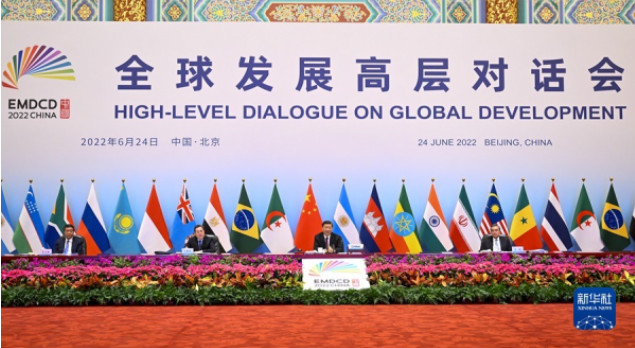By Guilherme Wilbert for the Saker Blog
Since the beginning of Operation Z in Ukraine, unfortunately interpreted as an invasion or an occupation of Ukrainian territory by the Russians, realpolitik has accelerated integration among economic blocs of emerging countries, with several speeches by BRICS regional leaders speaking openly about the weight of emerging economies in global economic development.
The last BRICS meeting on 06/23, with open criticism of western sanctions by China and Russia, showed well what the emerging economies are discussing at the moment: how to escape dollarized debt? Or better yet: how to implement an alternative system to the one established at Bretton Woods?
Vladimir Putin, the Russian president who overnight became "persona non grata" in Europe, is already talking openly about a possible basket of BRICS own currencies as an alternative to strengthen the national economies, with the most advanced countries, for example Russia itself or China, working openly with an economy of real production based on resource ballast for their national currencies, in the Russian case the Gaso-Ruble becomes a character, in the Chinese case, the PetroYuan emerges as an alternative to strengthen the Chinese currency.
Caution is walking hand in hand with haste for the emerging countries
While emerging countries are trying to gain international prominence through economic blocs that can prove to be alternative to the current international financial system, the members of these blocs, especially China, despite acting as a kind of leadership in this global turn towards de-dollarization, do not show imperialistic intentions as seen in the U.S. within their geopolitical blocks. For example, NATO, where it is clearly an aggressive military alliance led by the US to impose its policies and state interests. On the other side, this is not seen within the BRICS or Mercosur for example with a military alliance led by China or with groupings supported by the Chinese establishment for color revolutions in non-aligned countries.
Therefore the caution: BRICS cannot emerge as an alternative to do the same things in the same ways committing the same Western mistakes, in fact the opposite, if negotiating with Westerners you would be willing one day to have to deal with Uncle Sam carrying out a lawfare in its territory to overthrow a legitimate government, with China the concern is much more diplomatic regarding Taiwan for example, with criticism much more focused on humanitarian aspects by some analysts.
Brazilian diplomacy has shown concern with the political intentions of the BRICS, wanting the strategic partnership to continue in a win-win system and not to mix geopolitical meanings in order to face the old system, but this is due to the fact that Brazil is still strongly influenced by Washington, despite its recent independent foreign policy.
We are witnessing a paradigm shift in all senses with this Russian police operation in Ukraine, which revealed the face of the irresponsible weak western leaders that have hurt the global economy by causing 1. sanctions to have the reverse effect to the desired one (of breaking the Russian economy) and 2. sanctions to have the opposite effect to the desired one (of breaking the Russian economy). Many countries that carry out military offensives on their neighbors (like Saudi Arabia in Yemen) even though supported by international law and ratifying humanitarian conventions on the battlefield saw that Westerners, unfortunately, can still simply loot the wealth of some countries they consider non-aligned like Russia, Iran, Venezuela And given this the emerging countries logically seek an alternative, with the difference being that for Westerners to do what was accomplished in Libya when Gaddafi attempted the same, they will now have to deal with a bear sitting on just over 5,000 nuclear warheads. The conversation is now essentially different.
Guilherme Wilbert is a Bachelor's Law with interests in geopolitics and international law.
References: investogist.com
noticias.uol.com.br
